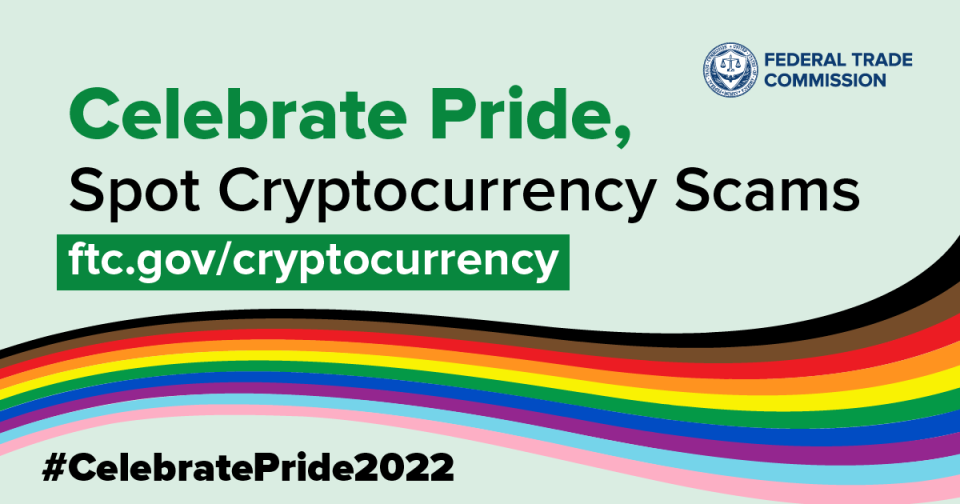Cryptocurrency is the latest way that scammers are asking people to pay. And that’s important to know, since recent reporting suggests that crypto scams have an outsized impact on the LGBTQ+ community. As we celebrate Pride Month, watch for these top crypto-related scams: investment scams and impersonators.
Most crypto-related investment scams start with an unsolicited text, email, or message on social media (including dating sites and apps) with a promise: make lots of money with zero risk. But only if you buy or send crypto to the person contacting you (a scammer).
With impersonators, it's all about gaining your trust — someone claiming to be from a well-known company, government agency, or someone on a trusted job website will contact you about a supposed problem with an account, benefits, or a job offer. But then they'll ask for money and demand a crypto payment. These are all scams.
To steer clear of most crypto-related scams, know that:
- Only scammers demand payment in cryptocurrency to pay for something in advance or to protect your money. That’s always a scam.
- Only scammers will guarantee you’ll make lots of money or big returns. Don’t trust people who promise quick and easy money by helping you invest in the crypto markets.
- Online dating and investment advice don’t mix. If a new keyboard Casanova wants to show you how to invest in crypto, or asks you to send them crypto, that’s a scam, too.
Report any crypto scams to ReportFraud.ftc.gov. And for more on what to know about cryptocurrency and scams, visit ftc.gov/cryptocurrency.


"[S]ince recent reporting suggests that crypto scams have an outsized impact on the LGBTQ+ community. "
This statement didn't appear to be addressed in the article leaving one to wonder why "[C]rypto scams have an outsized impact," etc.
Why is crypto-currency scams effecting LGBTQ+ communities more than anyone else? Blanket statement sows doubt in my mind.
I'm not saying that cryptocurrency scams CAN'T somehow disproportionately affect LGBTQ+ communities, I don't know enough about cryptocurrency scams to know if that's a reasonable possibility. But as a transgender and bisexual man who has spent the majority of his life involved in gay/trans rights activism and surrounded by gay/trans friends, I DO know a lot about LGBTQ+ communities, and I simply cannot figure out why crypto scams would disproportionately affect people like me. Maybe it's an indirect effect of some sort of intersectional kind of effects, like maybe if those of lower socioeconomic status are more likely to be victims of scams due to desperation to improve their situation and if LGBTQ+ communities are sometimes/often disproportionately low-income -- an "a = b, and b = c, therefore a = c" kind of situation -- but even I think that's a stretch. If anyone involved in the writing of this alert or of the "recent reporting" that was referenced would like to clarify what was reported and what their intended message was, or if anyone can find the "recent reporting" sources that were referenced (the ones claiming crypto scams have an "outsized impact" on LGBTQ+ communities), that'd be much appreciated and feel free to reply to this since I seem to not be the only person that had more questions after reading this article than before reading.